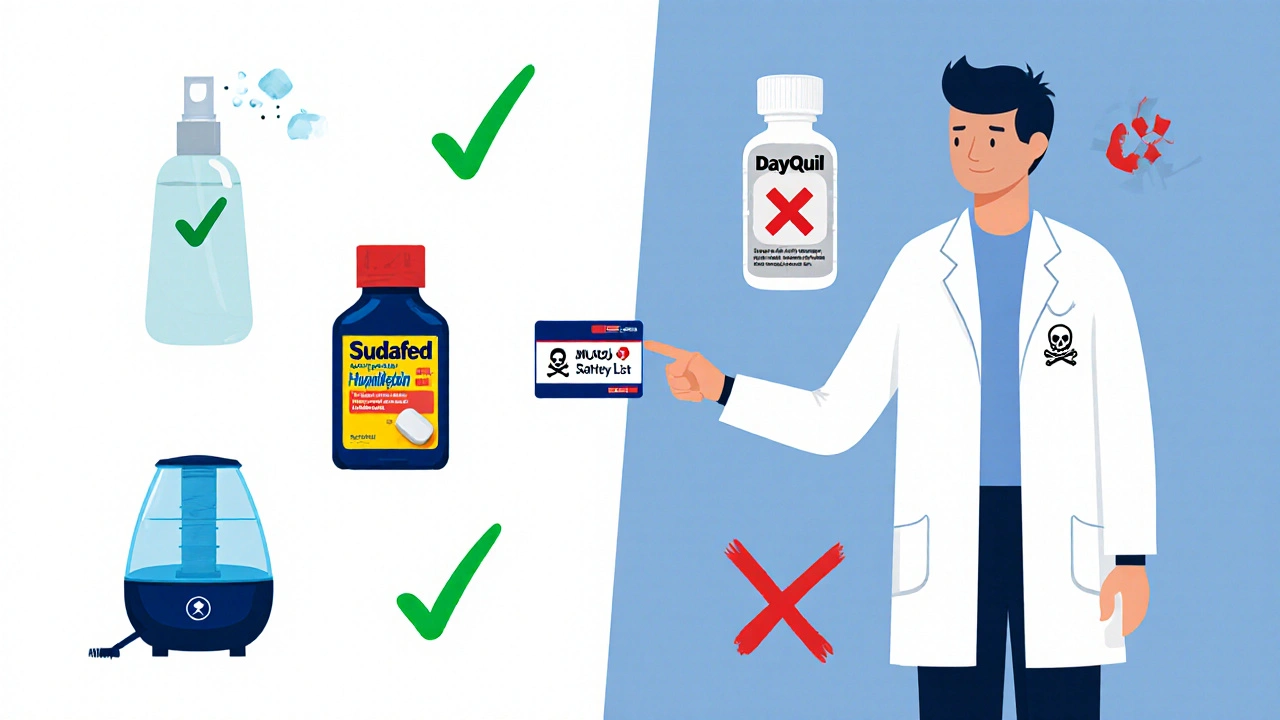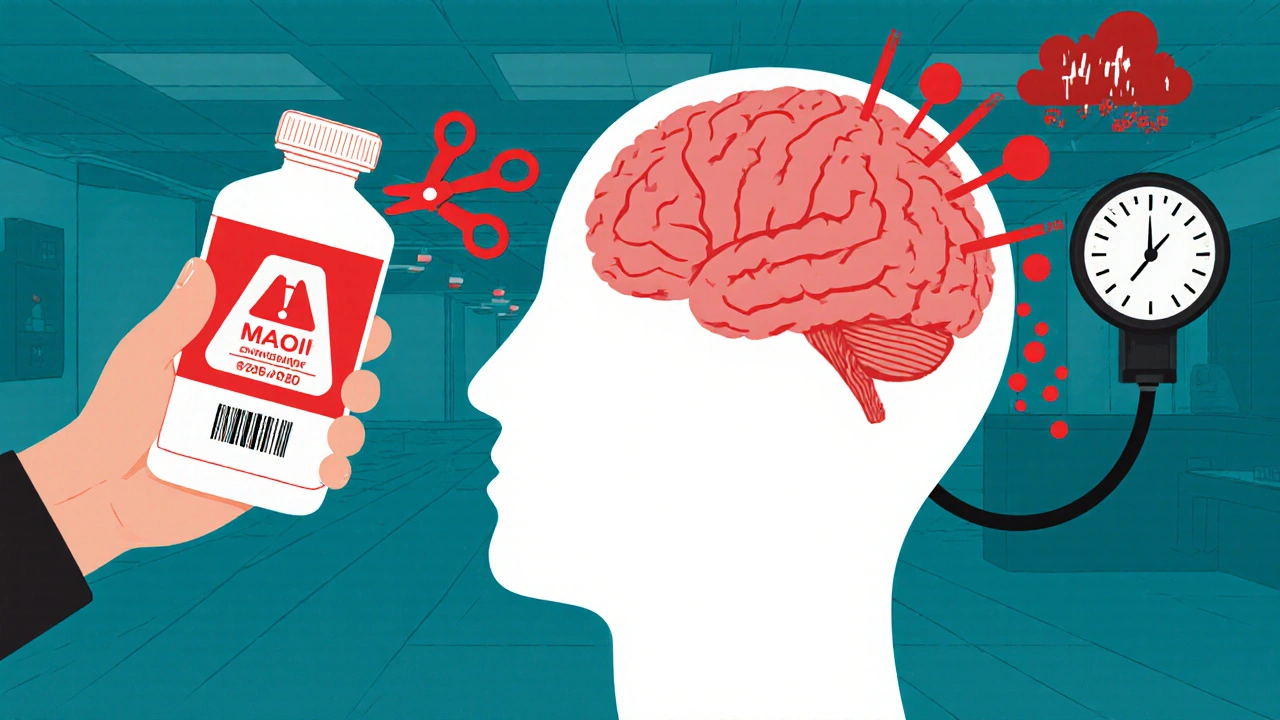MAOI Cold Medicine Safety Checker
Check Your Cold Medicine
Enter active ingredients from your cold medicine label to check if it's safe with MAOIs.
If you're taking an MAOI for depression, a simple cold remedy could send you to the emergency room. This isn't a scare tactic - it's a documented, life-threatening risk that even some doctors overlook. Between 2018 and 2022, the FDA recorded 127 cases of hypertensive crisis linked to MAOIs and over-the-counter cold meds. Eighteen of those cases required hospitalization. And it’s not just about blood pressure spikes - combining MAOIs with common cough syrups can trigger serotonin syndrome, a condition that can cause seizures, organ failure, and death.
What Are MAOIs and Why Do They Matter?
MAOIs - monoamine oxidase inhibitors - are antidepressants like phenelzine (Nardil), tranylcypromine (Parnate), and isocarboxazid (Marplan). They work by blocking enzymes that break down key brain chemicals: serotonin, norepinephrine, and dopamine. This helps lift mood in people who don’t respond to SSRIs or SNRIs. But that same mechanism makes them dangerous when mixed with certain drugs.
Even the transdermal patch version, selegiline (Emsam), carries the same risks at standard doses. Though it’s become more popular - making up 68% of MAOI prescriptions in 2022 - it doesn’t make you safe from interactions. The FDA still requires black box warnings on all MAOI packaging. That’s the strongest warning they give.
The Two Deadly Risks: Hypertensive Crisis and Serotonin Syndrome
There are two major dangers when MAOIs meet OTC cold medicines:
- Hypertensive crisis: A sudden, dangerous spike in blood pressure - often over 200/110 mmHg. This can cause stroke, heart attack, or aortic dissection.
- Serotonin syndrome: Too much serotonin in the brain. Symptoms include agitation, rapid heart rate, high fever, muscle rigidity, and seizures.
These aren’t rare side effects. They’re direct chemical reactions. MAOIs stop your body from breaking down certain compounds. So when you take a decongestant like pseudoephedrine (Sudafed) or phenylephrine (Sudafed PE), your body can’t clear the extra norepinephrine it releases. That norepinephrine piles up, and your blood pressure rockets.
With dextromethorphan (found in Robitussin DM, Delsym, DayQuil, and NyQuil), the problem is different. It boosts serotonin. So does your MAOI. Together, they overload the system. According to the NCBI Bookshelf, this combo is “the most toxic” for triggering serotonin syndrome.
Which OTC Cold Medicines Are Dangerous?
You can’t just read the front of the bottle. The real danger is in the “Active Ingredients” list. Here’s what to avoid:
- Pseudoephedrine - Sudafed, Claritin-D, Zyrtec-D
- Phenylephrine - Sudafed PE, Mucinex D, Benadryl Allergy & Sinus
- Dextromethorphan - Robitussin DM, Delsym, DayQuil, NyQuil, Coricidin HBP Cough & Cold
- Phenylpropanolamine - No longer sold in the U.S., but still found in some imported or older products
Here’s the kicker: 78% of OTC cold and flu products contain at least one of these ingredients. That means most cough syrups, sinus pills, and multi-symptom remedies are off-limits.

What Can You Safely Take Instead?
You don’t have to suffer through a cold. There are safe alternatives:
- For cough: Guaifenesin (Mucinex) - breaks up mucus. No interaction risk.
- For fever or pain: Acetaminophen (Tylenol) - safe at normal doses. Avoid ibuprofen or aspirin if you’re on MAOIs, as they can affect platelet function.
- For runny nose: Saline nasal spray - no chemicals, no risk.
- For congestion: A humidifier or steam inhalation - natural and safe.
Always check the label. Even “cold and flu” products labeled “for high blood pressure” can contain phenylephrine or dextromethorphan. Don’t assume they’re safe.
What About Newer Antidepressants?
SSRIs like sertraline (Zoloft) and SNRIs like venlafaxine (Effexor) can also cause serotonin syndrome with dextromethorphan - but they don’t cause hypertensive crisis with decongestants. That’s the big difference.
MAOIs are unique in how they block enzyme activity. They’re irreversible, meaning your body has to make new enzymes to recover. That’s why the American Psychiatric Association recommends a 14-day washout period before switching to or from an MAOI. SSRIs don’t require that.
Bupropion (Wellbutrin) is another option. It has almost no interaction risk with OTC cold meds. For many patients, it’s a better first-line choice - unless they’ve tried everything else and still haven’t improved.
Real Stories, Real Consequences
One Reddit user took Sudafed with Parnate and ended up in the ER with blood pressure over 220/110. Another described 12 hours of severe headache, neck stiffness, and racing heart after taking DayQuil with Nardil. Both needed emergency care. Neither knew they were at risk.
On the flip side, a patient on PatientsLikeMe used a wallet card given by their psychiatrist listing every forbidden medication. They’ve avoided dangerous interactions for five years. That card? It saved their life.
How to Stay Safe
If you’re on an MAOI, here’s your action plan:
- Get a written list from your psychiatrist or pharmacist of all dangerous OTC drugs. Print it. Keep it in your wallet.
- Always check labels - even if you’ve used a product before. Formulas change.
- Ask the pharmacist before buying anything. Say: “I’m on an MAOI. Is this safe?” Don’t assume they know.
- Carry a medical alert card or app listing your medication. Emergency responders need to know.
- Never take more than one cold product at a time. Multi-symptom formulas are the biggest trap.
It takes 3 to 5 conversations with a pharmacist to fully understand these risks, according to a University of North Carolina study. Don’t rely on memory. Don’t trust online forums. Use trusted sources like the MAOI Nutrition Support website, which updates its lists monthly and gets over 15,000 visits a month.
The Future: Are Safer MAOIs Coming?
Research is underway. A new reversible MAO-A inhibitor called CX-1010 is in Phase II trials (NCT04567812). If it works, it could offer the benefits of MAOIs without the deadly interactions. But it’s still years away.
For now, MAOIs remain one of the few treatments that work for severe, treatment-resistant depression. Studies show response rates over 50% in these patients - higher than SSRIs. That’s why they’re still used, even though they make up less than 1% of all antidepressant prescriptions in the U.S.
As Dr. Alan Schatzberg from Stanford says: “No new antidepressant has matched MAOIs’ effectiveness in treatment-resistant cases since they were introduced.” That’s why the risk is worth managing - but only if you manage it correctly.
Can I take Tylenol with MAOIs?
Yes, acetaminophen (Tylenol) is generally safe to use with MAOIs for pain or fever. It doesn’t affect serotonin or norepinephrine levels. Avoid NSAIDs like ibuprofen or aspirin unless your doctor approves them - they can increase bleeding risk, especially if you’re also on other medications.
Is it safe to take DayQuil if I’m on an MAOI?
No. DayQuil contains dextromethorphan and phenylephrine - both dangerous with MAOIs. Dextromethorphan can trigger serotonin syndrome. Phenylephrine can cause a hypertensive crisis. Even one dose can be enough to cause a medical emergency. Always choose single-ingredient alternatives like guaifenesin or acetaminophen.
How long should I wait after stopping an MAOI before taking OTC cold medicine?
Wait at least 14 days after stopping any MAOI before taking any OTC cold medicine containing dextromethorphan, pseudoephedrine, or phenylephrine. MAOIs are irreversible inhibitors - your body needs time to produce new enzymes. Even after 14 days, check with your doctor before restarting any medication.
Do all MAOIs have the same interaction risks?
Yes. Whether it’s oral phenelzine, tranylcypromine, or the transdermal selegiline patch, all MAOIs carry the same interaction risks with OTC cold medicines. The patch may reduce dietary tyramine restrictions at low doses, but it does not reduce risks from decongestants or cough suppressants. Never assume a different form is safer.
What should I do if I accidentally take a dangerous OTC medicine?
If you’ve taken a decongestant or dextromethorphan-containing product while on an MAOI, seek medical help immediately. Symptoms of hypertensive crisis include severe headache, chest pain, blurred vision, nausea, or confusion. Serotonin syndrome symptoms include agitation, rapid heartbeat, high fever, or muscle stiffness. Don’t wait. Call 911 or go to the ER. Bring your medication list.


Sarah Cline
October 31, 2025 AT 05:14I took a DayQuil last winter without thinking and ended up with a pounding headache and heart racing for hours. Never again. I keep a printed list in my wallet now and show it to every pharmacist. It’s not worth the risk.
Sierra Thompson
October 31, 2025 AT 21:18It’s staggering how many people assume OTC means safe. The FDA data alone should be enough to make this common knowledge. Yet here we are, still losing people to avoidable interactions because no one bothered to teach this in med school or public health campaigns. It’s not just negligence-it’s systemic failure.
Khaled El-Sawaf
November 1, 2025 AT 07:35Let’s be clear: anyone who takes an MAOI and then self-medicates with OTC cold remedies is not just irresponsible-they’re endangering emergency responders, hospital staff, and public resources. This isn’t a personal choice; it’s a public health liability. The fact that this is still even a conversation speaks volumes about the erosion of medical literacy.
Musa Aminu
November 2, 2025 AT 23:06Why is it always the African and Asian diaspora who get blamed for not knowing this? My cousin in Lagos took Sudafed and lived. Maybe your meds are just weak. Why don’t we fix the system instead of blaming patients?
Nawal Albakri
November 4, 2025 AT 03:24They don’t want you to know this, but the pharmaceutical companies made sure MAOIs are hard to get so they can sell you SSRIs instead. And guess what? SSRIs have their own deadly interactions too-just quieter. They’re not trying to save you, they’re trying to profit. The whole system is rigged.
robert maisha
November 5, 2025 AT 12:24The irreversible nature of MAOIs means the body must regenerate enzyme activity which takes time and biological energy. This is why the 14 day washout is not arbitrary but physiologically necessary. The body does not operate on convenience and neither should we
Okechukwu Uchechukwu
November 5, 2025 AT 12:55It’s ironic that the same people who demand transparency in food labels don’t read the tiny print on cough syrup bottles. We live in a world where you can trace your avocado back to the farm but you’ll still swallow a cocktail of unknowns because it says ‘natural relief.’
Megan Oftedal
November 6, 2025 AT 04:14I’m on Nardil and I just wanted to say thank you for this. I’ve been so scared to even take Tylenol. Now I know it’s safe. I printed your list and laminated it. My pharmacist cried when I showed it to him. We’re not alone.